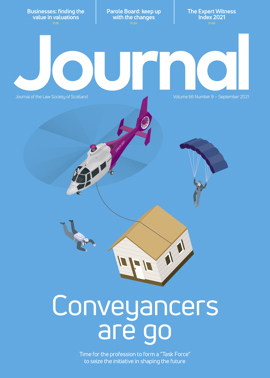Editorial: Stay on screen
Remote court hearings, or in-person? The subject of continuing debate over the past year, the issue is brought to a head by the Scottish Civil Justice Council’s draft rules covering modes of hearing once the emergency measures expire.
As we have reported, the default position is for online save in relatively limited situations. But despite some quite complex proofs having been successfully conducted online, many believe it remains a second best solution: a Society survey revealed a large majority who found examining witnesses (in chief or cross) more difficult, and felt their clients’ interests were disadvantaged, in remote hearings; and a strong joint statement by the UK and Irish bars called for the restoration of in-person for any hearing potentially dispositive of all or part of a case.
It may not come as a great surprise that those most practised in traditional hearings are keen for them to continue wherever possible, but it should be recognised that some cogent points have been made. Technology difficulties affecting evidence, the ability to read the court, taking on-thespot instructions from clients, newer lawyers learning court skills, for example, along with wellbeing issues and loss of collegiality, deserve to be fully considered. While the consultation paper appears to recognise the strength of feeling, it has less to say about the arguments.
The conference on the subject held in May recognised the value of working in partnership with agencies across the justice system, and what had by then been achieved by collaborative working during the pandemic. But there appears to be a desire now to push much further with change than many either feel comfortable with or are as yet willing to accept. True, the default position can be reversed on application, to be granted (per the draft rules) “only if” the court is of opinion that it would not prejudice fairness or otherwise be contrary to the interests of justice. At first sight, it is hard to see how an in-person hearing would fail that test, unless a party has difficulty physically attending, but one suspects such hearings are not intended to be there for the asking.
There is some danger of the debate taking place without proper recognition of the pressures created by the huge backlog of criminal work that built up during lockdown. If this is driving the proposals, it would be better to be open about it and let the debate embrace that aspect. If it is not, there is surely a risk of unnecessarily sacrificing the goodwill of the profession in the supposed interests of efficiency, and it has to questioned whether justice would benefit.
Regulars
Perspectives
Features
Briefings
- Civil court: Legacy of COVID
- Corporate: The enigma of economic duress
- Employment: where will work be found?
- Intellectual property: David v Goliath battle continues
- Agriculture: Crofting disputes: some first principles
- Sport: Arbitration – within the rules?
- Property: ADS: the hidden traps
- In-house: On harm, stakeholders and risk management
In practice
- Ask Ash: Colleague's chat is my privacy
- Lockdown no more
- The Word of Gold: The potency of passion
- Get interactive at the Law and Technology Conference
- Ten red flags for conveyancers
- The Eternal Optimist: So, what do you want to be?
- Commissary: the top 10 failings
- Mobility challenges – and the kindness of strangers
- When all is remote






